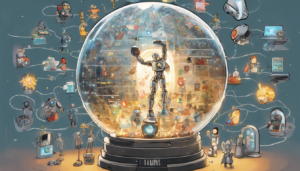In this week’s tech news, the AI and robotics world sees significant strides with new innovations, funding, and legal challenges. From advanced robotics research to breakthrough funding for AI-driven search engines, the industry is abuzz with excitement and concerns. Stay tuned for the latest updates and developments.
Your user agent does not support mp3 or the HTML5 Audio element.
Google DeepMind Robotics Team introduces AutoRT, SARA-RT, and RT-Trajectory to advance robotics research
Google DeepMind Robotics Team has announced the launch of AutoRT, SARA-RT, and RT-Trajectory to advance robotics research. These systems aim to improve real-world robot data collection, speed, and generalization, bringing us closer to a future where robots can understand and carry out practical human goals. AutoRT harnesses large models to better train robots, SARA-RT makes Robotics Transformers leaner and faster, and RT-Trajectory helps robots generalize their movements. These advancements mark a significant step towards the development of more capable and helpful robots for various real-world applications.
Intel’s Gaudi 2 AI Accelerator Outperforms Nvidia in Price Performance
New research from Databricks confirms that Intel’s Gaudi 2 AI accelerator outperforms Nvidia’s offerings in terms of price performance. For large language model inference, Gaudi 2 matches the latency of Nvidia H100 systems and outperforms the Nvidia A100. While Nvidia still provides more training performance, Databricks’ research shows that Gaudi 2 offers the best dollar-per-performance for both training and inference. This validation from a third party further solidifies Intel’s position in the AI accelerator market.
Perplexity AI Raises $73.6 Million to Challenge Tech Giants with AI-driven Search Engine
California-based startup Perplexity AI has raised $73.6 million in a series B round of funding, bringing its total funding to $100 million. The company plans to use the capital to further develop its AI-driven search engine and compete with tech giants like Google and Microsoft. Perplexity aims to offer a conversational knowledge search platform that provides accurate and transparent information, without the need to sift through multiple web pages or sponsored links. With backing from notable tech figures and a growing user base, the company faces the challenge of taking on established players in the search engine space.
Microsoft Introduces New Copilot Key for AI-Powered Windows PCs
Microsoft has announced the addition of a new Copilot key for AI-powered Windows PCs. This marks the first significant change to the Windows PC keyboard in nearly three decades. The Copilot key will be a core part of the PC keyboard, ushering in a shift towards a more personal and intelligent computing future. Availability is expected to begin in late February through Spring on upcoming Surface devices.
New Research Shows Humans Vulnerable to Deceptive Digital Images, Impacts AI Safety
New research published in Nature Communications reveals that digital images altered to deceive computer vision systems can also influence human perception. The study found that humans are indeed susceptible to subtle adversarial perturbations, highlighting a similarity between human and machine vision. This discovery emphasizes the need for further research to understand the impact of adversarial images on both people and AI systems, raising critical questions for AI safety and security research. The findings could inform efforts to build safer AI systems and improve the robustness of computer vision models by aligning them with human visual representations.
Nabla Secures $24 Million for AI Copilot Revolutionizing Medical Consultations
French startup Nabla, which has developed an AI copilot to assist doctors during consultations, has secured $24 million in funding. The AI copilot, called Nabla Copilot, generates clinical notes almost instantly, saving doctors the trouble of manual documentation. This innovation has already been adopted by over 20,000 providers and is expected to revolutionize medical consultations in the near future. The funding will be used to expand Nabla’s reach in the U.S. and further develop the AI-driven future for physicians.
AI Decision-Makers Enthusiastic About Generative AI, But Concerns Persist
Forrester’s survey of 220 AI decision-makers reveals that while many are enthusiastic about generative AI, concerns about risks and barriers to adoption persist. These include issues like violating data protection laws, skill and governance challenges, and the risk of biases and hallucinations affecting the quality of AI outputs. Despite this, organizations are eager to explore the transformative potential of generative AI and are considering increased investment in data/AI initiatives. However, they will need to address these barriers to fully operationalize the technology for planned use cases.
OpenAI GPT Store to Launch Next Week, Allowing Users to Monetize Custom AI Agents
OpenAI has announced that its GPT Store, a platform for selling and sharing custom AI agents created using OpenAI’s GPT-4 large language model, will finally launch next week. The store, exclusively available to ChatGPT Plus and enterprise subscribers, will empower individuals to craft personalized versions of ChatGPT-style chatbots and monetize their GPTs. The launch, initially delayed due to company events, is eagerly anticipated by users looking to showcase and profit from their unique GPT creations.
OpenVoice: MyShell’s Open-Source AI Revolutionizes Voice Cloning Technology
MyShell has unveiled OpenVoice, an open-source AI that offers voice cloning with unprecedented speed and accuracy. Developed by researchers at MIT, Tsinghua University, and MyShell, OpenVoice allows granular control over tone, emotion, accent, rhythm, and more using just seconds of audio. The AI comprises two models for text-to-speech conversion and voice tone cloning, enabling instant voice cloning with very little data. This breakthrough in voice cloning technology has the potential to revolutionize the way we interact with AI.
New York Times Sues OpenAI and Microsoft for Copyright Infringement
The New York Times has filed a lawsuit against OpenAI and Microsoft for copyright infringement, making it a significant copyright battle to watch in 2024. The lawsuit calls for “billions of dollars in statutory and actual damages” and the destruction of any chatbot models and training data using New York Times copyrighted material. Legal experts predict this case could potentially reach the Supreme Court, as generative AI copyright battles continue to impact industries such as publishing and entertainment. OpenAI and Microsoft are expected to vigorously defend themselves, with implications for the future of copyright law and innovation.




